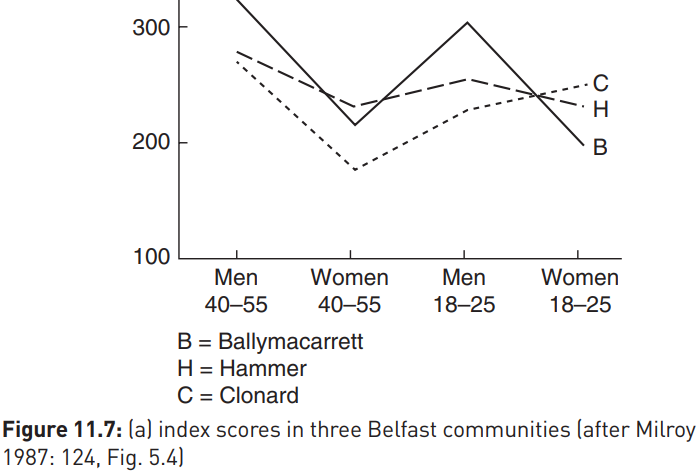


 Grammar
Grammar
 Tenses
Tenses
 Present
Present
 Past
Past
 Future
Future
 Parts Of Speech
Parts Of Speech
 Nouns
Nouns
 Verbs
Verbs
 Adverbs
Adverbs
 Adjectives
Adjectives
 Pronouns
Pronouns
 Pre Position
Pre Position
 Preposition by function
Preposition by function 
 Preposition by construction
Preposition by construction
 Conjunctions
Conjunctions
 Interjections
Interjections
 Grammar Rules
Grammar Rules
 Linguistics
Linguistics
 Semantics
Semantics
 Pragmatics
Pragmatics
 Reading Comprehension
Reading Comprehension|
Read More
Date: 2023-11-03
Date: 29-6-2022
Date: 2023-05-25
|
The sociolinguistic gender pattern (SGP)
Women have been found consistently to use more standard or prestige forms than comparable men: this finding became known as the sociolinguistic gender pattern (SGP).
None of the explanations for the SGP is unproblematical, and indeed Trudgill’s original rider ‘allowing for other factors such as social class, ethnic group and age’ raises a number of difficulties. It is particularly difficult to control for social class when, as at the time of the Norwich study, a significant proportion of women were not in paid employment, and were often assigned the same score as their husbands on occupational criteria. The one area of general agreement is that there is no biological basis for gender-based differentiation, and indeed, there is evidence that under certain social conditions, the SGP can be reversed.

In her seminal Belfast study, Lesley Milroy examined the use of the (a) variable, for which a wide range of local vernacular variants had been identified, in three Belfast communities: Ballymacarrett, the Hammer and the Clonard. As the graph above shows, in two of these communities the pattern was as expected for both younger and older speakers, but in the Clonard younger women had higher vernacular scores for this variable than younger men. Milroy explains this unexpected pattern in terms of changing social network structures. Significantly, the Clonard had been affected by unemployment in a different way from the other communities: here, younger women were more likely to be in stable employment than men. The workplace, which requires people to conform and show solidarity, acts as a powerful linguistic norm enforcement mechanism, to which men have traditionally been subjected to a greater degree than women.
The role-reversal among younger Clonarders left women rather than men subject to the normative pressure of the workplace, with the result that the women’s social networks were more dense and their vernacular accordingly more focused in terms of regular use of ‘broad’ Belfast variants. The men’s vernacular, by contrast, was more diffuse, that is to say they did not use these forms with anything like the same consistency. The importance of social networks for our understanding of linguistic change, cannot be underestimated.
More recent findings have prompted a re-evaluation of the sociolinguistic gender pattern by suggesting that, rather than favoring prestige forms per se, women are more likely than men to avoid highly localized variants, and in fact often lead change in the direction of non-local, non-standard norms. On Tyneside, for example, younger middle-class women were found by Milroy et al. (1994) to be leading change away from the local glottalized ( variant of /t/, and towards the glottal stop
variant of /t/, and towards the glottal stop  , which is widely used in many urban British dialects. We are left with what has become known as the ‘gender paradox’, namely that women appear both to favour conservative prestige forms and to lead innovation in the direction of new non-standard forms.
, which is widely used in many urban British dialects. We are left with what has become known as the ‘gender paradox’, namely that women appear both to favour conservative prestige forms and to lead innovation in the direction of new non-standard forms.
Sociolinguists have, however, become less and less comfortable with viewing gender in a deterministic sense. Penelope Eckert has notably emphasized speaker agency in use of language to create and form identities, and seen gender less as something defining a person than as something which one ‘does’. The relative importance of gender in shaping a person’s identity may well change with age, and may vary for the same person according to situation: the use of particular variants may increase in situations where one wishes to assert a gender identity, and reduce in situations where that gender identity is less important.
|
|
|
|
تفوقت في الاختبار على الجميع.. فاكهة "خارقة" في عالم التغذية
|
|
|
|
|
|
|
أمين عام أوبك: النفط الخام والغاز الطبيعي "هبة من الله"
|
|
|
|
|
|
|
قسم شؤون المعارف ينظم دورة عن آليات عمل الفهارس الفنية للموسوعات والكتب لملاكاته
|
|
|